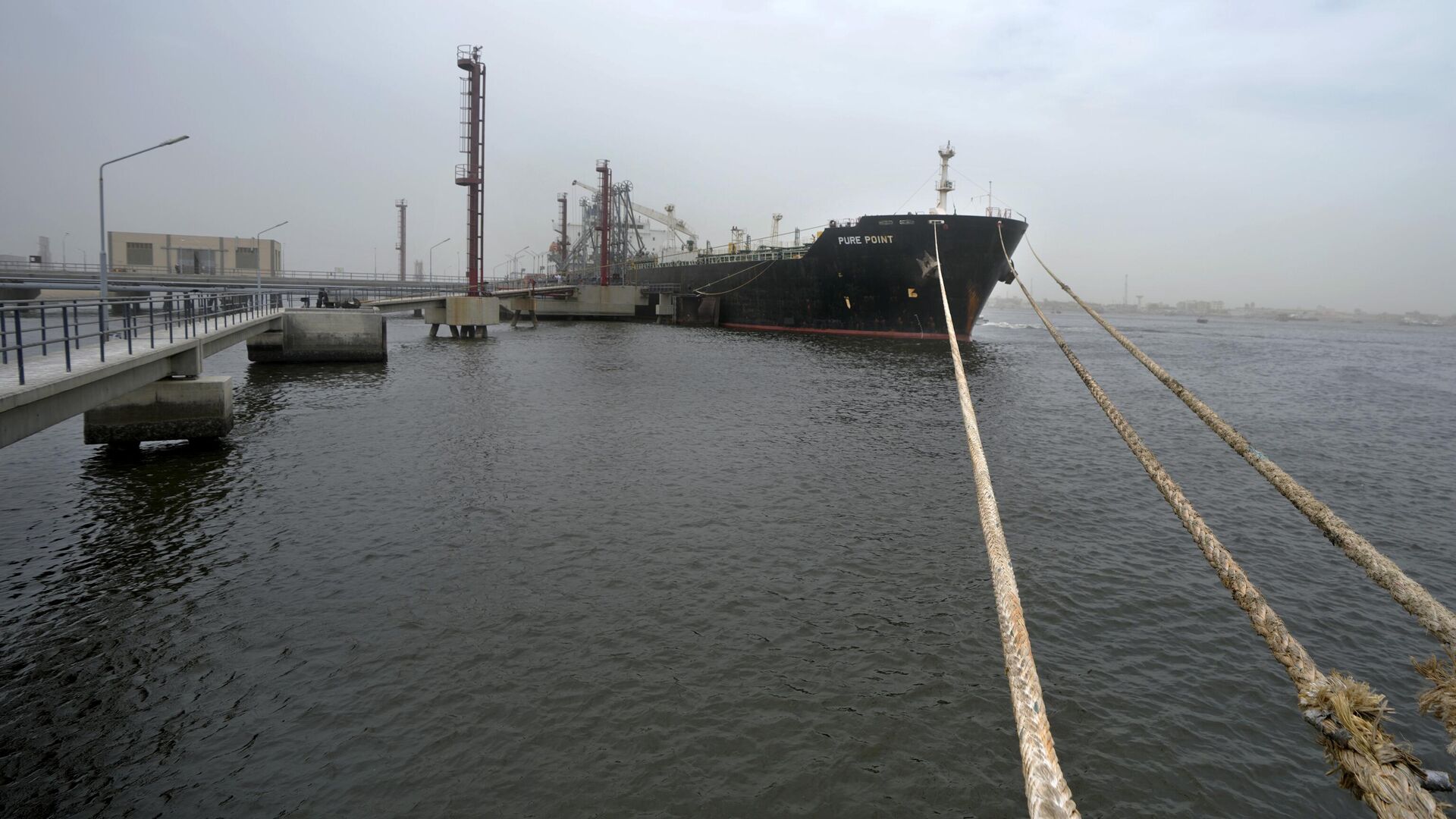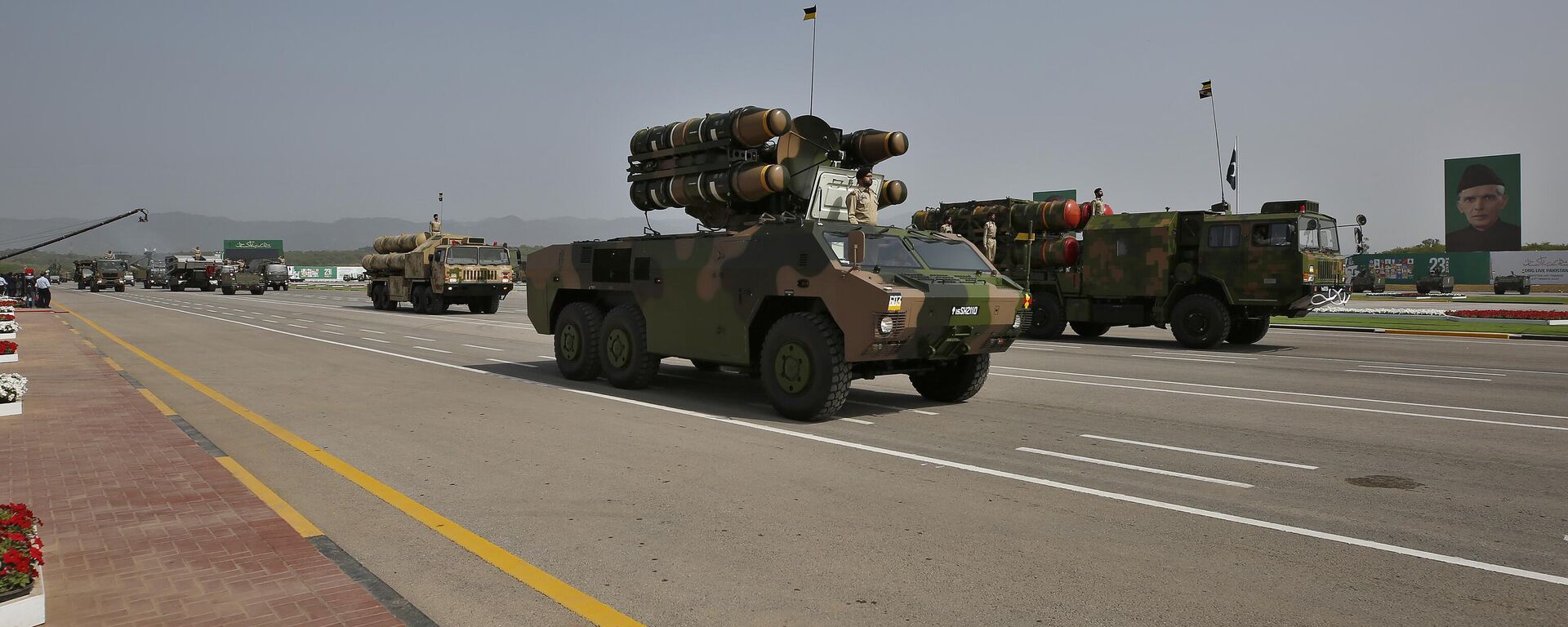https://sputniknews.in/20230718/pakistan-russia-oil-deal-requires-reliable-stakeholder-for-long-term-guarantees-3043115.html
Pakistan-Russia Oil Deal Requires 'Reliable Stakeholder for Long Term Guarantees'
Pakistan-Russia Oil Deal Requires 'Reliable Stakeholder for Long Term Guarantees'
Sputnik India
Pakistan has been relying on the Middle Eastern oil market for a long time, but recently Russian oil opened an avenue for energy imports from diversified... 18.07.2023, Sputnik India
2023-07-18T13:08+0530
2023-07-18T13:08+0530
2023-07-18T13:08+0530
sputnik opinion
pakistan
russian oil
south asia
political crisis
economics
oil supplies
islamabad
trade corridor
https://cdn1.img.sputniknews.in/img/07e7/06/0f/2508044_0:160:3072:1888_1920x0_80_0_0_b3a145c60a04d7270b46bec4042510ba.jpg
A recent report by Express Tribune has suggested that the oil deal between Russia and Pakistan is facing some difficulties. It was said that the two countries had agreed to form a Special Purpose Vehicle (SPV) in order to make the transportation of crude oil easier, but so far there have been delays in starting the process by Islamabad. According to the report, another hurdle is the fact that Pakistan's current coalition government has little time left in office as elections are due later this year.Moreover, the government allegedly needs to decide whether it wants the state to get involved in the long-term purchase deals of oil, or allow the oil industry to do commercial deals with Russian firms, in which case the oil industry will be responsible for profit or loss.The First BatchIn June, Pakistan Refinery Limited (PRL) imported 100,000 tons of crude oil from Russia. Of the total, it has refined 50,000 tons, while the remaining is yet to be processed.Pakistan is looking for new sources of energy imports as prices rose internationally. Islamabad was mainly importing crude from the UAE, Saudi Arabia and Qatar, but due to the economic crisis, the country was short of foreign currency to pay for fuel imports. Hence, the country's leaders approached Russia in an attempt to secure oil at a discount.Energy imports account for most of Pakistan's external payments. The country imports nearly 80 percent of its needs, ringing up an import bill of $13 billion in the 2022-23 fiscal year. Hence, getting the discounted Russian crude oil was aimed at helping stabilize oil prices in Pakistan.The first batch of the shipment was to test the process and see if it would be viable for both countries to enter into a long-term partnership. Pakistan's neighbor India is currently South Asia's largest importer of Russian crude, with New Delhi's imports standing at 1.64 million barrels per day in April.So what could be the reasons for the reported roadblocks in this mutually-beneficial transaction?Sputnik spoke to experts to learn more about the matter.According to Faran Jeffery, director of UK-based Midstone Centre for International Affairs, these hurdles are not surprising.He went on to say that the Pakistani government is disregarding the fact that India and Russia have been close allies all these years and their ties go well beyond Russian oil exports.Need for a Reliable StakeholderHowever, in Jeffery's opinion, it is too early to say if this deal will collapse entirely."Moscow may be looking for a reliable stakeholder in Pakistan for guarantees that any signed agreement will be upheld regardless of the change in government in Islamabad. That stakeholder is usually the Pakistani military, but I'm not too sure how far Moscow would go with relying on the military's guarantees, considering how the military's involvement in domestic politics is partially what is causing instability in Pakistan in the first place," the analyst added.Sputnik also spoke with Syed Ali Zia Jaffery, deputy director of the Center for Security, Strategy and Policy Research at the University of Lahore, who shared his views on the matter."Pakistan started exploring the possibility of purchasing cheap oil from Russia during the government of former prime minister Imran Khan, who visited Russia in February 2022," Ali said.He went on to explain that there was a lot of political wrangling around this potential deal for over one year, after the former PM was ousted and the current government of Shahbaz Sharif was working out the details, claiming that Pakistan cannot buy and refine the Russian oil, but eventually managing to do both, buying and refining the crude.The Right Kind of NegotiationsHe mentioned that perhaps Pakistan is losing an opportunity to seek out discounts because of the time that was wasted in getting the entire thing going, adding that the prospect of a long-term deal may not be bright at present because there is uncertainty surrounding the country’s politics.According to him, this situation also hinders Pakistan's ability to extract better concessions from Russia."I personally think that this deal will only be in the works if and when a new government with a powerful mandate comes into power, otherwise both Russia and Pakistan will take temporary measures which might not be advantageous to both the countries, not least Pakistan," Ali concluded.
https://sputniknews.in/20230706/economic-instability-becomes-curse-for-pakistan-armed-forces-2858665.html
https://sputniknews.in/20230713/political-uncertainty-intensifies-in-pakistan-as-end-of-governments-mandate-approaches-2990765.html
pakistan
south asia
islamabad
Sputnik India
feedback.hindi@sputniknews.com
+74956456601
MIA „Rossiya Segodnya“
2023
Aneela Rashid
https://cdn1.img.sputniknews.in/img/07e6/0c/0d/74548_0:0:485:484_100x100_80_0_0_821526e967ae85d041e2d30ee34fa1de.jpg
Aneela Rashid
https://cdn1.img.sputniknews.in/img/07e6/0c/0d/74548_0:0:485:484_100x100_80_0_0_821526e967ae85d041e2d30ee34fa1de.jpg
News
en_IN
Sputnik India
feedback.hindi@sputniknews.com
+74956456601
MIA „Rossiya Segodnya“
Sputnik India
feedback.hindi@sputniknews.com
+74956456601
MIA „Rossiya Segodnya“
Aneela Rashid
https://cdn1.img.sputniknews.in/img/07e6/0c/0d/74548_0:0:485:484_100x100_80_0_0_821526e967ae85d041e2d30ee34fa1de.jpg
oil trade, pakistan-russia oil deal, the middle eastern oil market, a long-term oil deal, russia pakistan relations
oil trade, pakistan-russia oil deal, the middle eastern oil market, a long-term oil deal, russia pakistan relations
Pakistan-Russia Oil Deal Requires 'Reliable Stakeholder for Long Term Guarantees'
Pakistan has been relying on the Middle Eastern oil market for a long time, but recently Russian oil opened an avenue for energy imports from diversified markets. However, a media report has stated that there are hurdles between the two countries striking a long-term oil deal.
A recent report by Express Tribune has suggested that the oil deal between Russia and Pakistan is facing some difficulties. It was said that the two countries had agreed to form a Special Purpose Vehicle (SPV) in order to make the transportation of crude oil easier, but so far there have been delays in starting the process by Islamabad.
According to the report, another hurdle is the fact that Pakistan's current coalition government has little time left in office as elections are due later this year.
Moreover, the government allegedly needs to decide whether it wants the state to get involved in the long-term purchase deals of oil, or allow the oil industry to do commercial deals with Russian firms, in which case the oil industry will be responsible for profit or loss.
In June, Pakistan Refinery Limited (PRL) imported 100,000 tons of crude oil from Russia. Of the total, it has refined 50,000 tons, while the remaining is yet to be processed.
Pakistan is looking for new sources of energy imports as prices rose internationally. Islamabad was mainly importing crude from the UAE, Saudi Arabia and Qatar, but due to the economic crisis, the country was short of foreign currency to pay for fuel imports. Hence, the country's leaders approached Russia in an attempt to secure oil at a discount.
Energy imports account for most of Pakistan's external payments. The country imports nearly 80 percent of its needs, ringing up an import bill of $13 billion in the 2022-23 fiscal year. Hence, getting the discounted Russian crude oil was aimed at helping stabilize oil prices in Pakistan.
The first batch of the shipment was to test the process and see if it would be viable for both countries to enter into a long-term partnership. Pakistan's neighbor India is currently South Asia's largest importer of Russian crude, with New Delhi's imports standing at 1.64 million barrels per day in April.
So what could be the reasons for the reported roadblocks in this mutually-beneficial transaction?
Sputnik spoke to experts to learn more about the matter.
According to Faran Jeffery, director of UK-based Midstone Centre for International Affairs, these hurdles are not surprising.
"These issues with the Russia-Pakistan oil deal were expected because the Pakistani government didn't do its homework before diving into this deal. For the Pakistani government it is crucial to one-up the previous government led by Imran Khan, and the current government is desperate to get a deal that is as good as the one that India got," Jeffery told Sputnik.
He went on to say that the Pakistani government is disregarding the fact that India and Russia have been close allies all these years and their ties go well beyond Russian oil exports.
Need for a Reliable Stakeholder
"Moscow's reluctance to sign a long-term deal with Pakistan is also quite clear, keeping in mind Pakistan's political instability. Considering the manner in which the former PM Imran Khan sabotaged CPEC and angered the Chinese, it is no surprise that other countries are maneuvering very carefully around Pakistan," the analyst said.
However, in Jeffery's opinion, it is too early to say if this deal will collapse entirely.
"Moscow may be looking for a reliable stakeholder in Pakistan for guarantees that any signed agreement will be upheld regardless of the change in government in Islamabad. That stakeholder is usually the Pakistani military, but I'm not too sure how far Moscow would go with relying on the military's guarantees, considering how the military's involvement in domestic politics is partially what is causing instability in Pakistan in the first place," the analyst added.
Sputnik also spoke with Syed Ali Zia Jaffery, deputy director of the Center for Security, Strategy and Policy Research at the University of Lahore, who shared his views on the matter.
"Pakistan started exploring the possibility of purchasing cheap oil from Russia during the government of former prime minister Imran Khan, who visited Russia in February 2022," Ali said.
He went on to explain that there was a lot of political wrangling around this potential deal for over one year, after the former PM was ousted and the current government of Shahbaz Sharif was working out the details, claiming that Pakistan cannot buy and refine the Russian oil, but eventually managing to do both, buying and refining the crude.
The Right Kind of Negotiations
He mentioned that perhaps Pakistan is losing an opportunity to seek out discounts because of the time that was wasted in getting the entire thing going, adding that the prospect of a long-term deal may not be bright at present because there is uncertainty surrounding the country’s politics.
"The government's tenure is now about to end and there is a great deal of confusion as to what will happen next, given the political instability in the country. We don't know if the election will take place on time, and in what shape it will take place. It's all about negotiations, so Russia might want to wait it out," Ali stated.
According to him, this situation also hinders Pakistan's ability to extract better concessions from Russia.
"I personally think that this deal will only be in the works if and when a new government with a powerful mandate comes into power, otherwise both Russia and Pakistan will take temporary measures which might not be advantageous to both the countries, not least Pakistan," Ali concluded.




